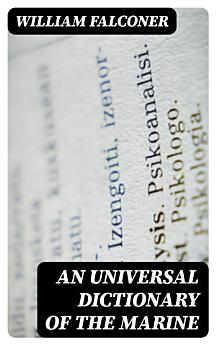An Universal Dictionary of the Marine
William Falconer
May 2022 · DigiCat
Ebook
571
Pages
family_home
Eligible
info
reportRatings and reviews aren’t verified Learn More
About this ebook
In "An Universal Dictionary of the Marine," William Falconer presents a comprehensive lexicon of maritime terminology that serves both as a practical resource for seafarers and as an insightful exploration of nautical culture. Written in an accessible yet erudite style, the dictionary encompasses terms spanning naval architecture, navigation, and maritime natural history, reflecting the Enlightenment's fascination with empirical knowledge and exploration. Falconer's work is notable for its clarity and organization, allowing readers to navigate the intricate world of maritime language with ease, and it stands as a significant contribution to the literature of the sea during the 18th century. William Falconer, also a poet and naval officer, drew on his personal experiences at sea to inform his writing. His understanding of the everyday life of mariners and the complexities of navigation imbues the dictionary with authenticity and depth, marking it as not only a reference work but also a reflection of the maritime ethos of his time. Falconer's dual perspective as both a practitioner and a scholar enriches the content, making it an essential text for those interested in marine literature. "An Universal Dictionary of the Marine" is highly recommended for maritime historians, sailors, and anyone intrigued by the language of the sea. Falconer's meticulous compilation of terms serves as an invaluable tool for understanding the profound relationship between humanity and the ocean, making it indispensable for both academic study and practical navigation.
About the author
William Falconer (1732 - 1769) was a distinguished Scottish poet and sailor whose literary contributions particularly resonate in the realm of nautical literature. Born in Edinburgh, Falconer's maritime career began at a young age, embedding him in the seafaring life that would deeply inform his writing. He is best recognized for his epic poem 'The Shipwreck' (1762), which draws from his harrowing experiences at sea, especially his survival of a shipwreck in the Aegean Sea. His expertise in the marine world is most profoundly showcased in 'An Universal Dictionary of the Marine' (1769), a comprehensive lexicon of nautical terms that became an invaluable reference for both the navy and merchant shipping. Falconer's meticulous documentation and description of the seaman's language and the technical aspects of 18th-century shipping practices not only illuminated the complexity of maritime vernacular but also reflected the hardships and the expertise required to navigate the dangerous waters of the time. His scholarly yet practical approach in cataloging nautical knowledge significantly enhanced the understanding and advancement of naval architecture and seamanship. Falconer's literary style combined his intimate knowledge of the sea with a scholar's attention to detail, creating works that have been of enduring value to maritime historians and literary scholars alike.
Rate this ebook
Tell us what you think.
Reading information
Smartphones and tablets
Install the Google Play Books app for Android and iPad/iPhone. It syncs automatically with your account and allows you to read online or offline wherever you are.
Laptops and computers
You can listen to audiobooks purchased on Google Play using your computer's web browser.
eReaders and other devices
To read on e-ink devices like Kobo eReaders, you'll need to download a file and transfer it to your device. Follow the detailed Help Center instructions to transfer the files to supported eReaders.








